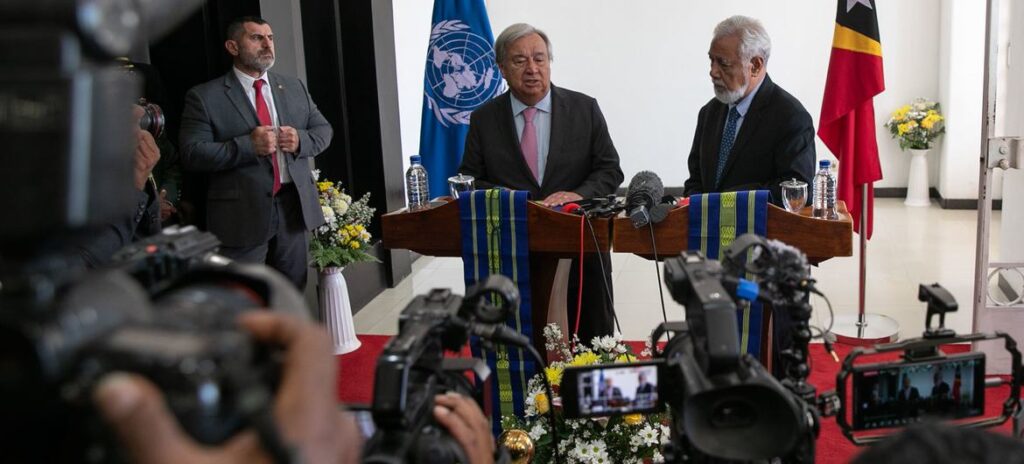António Guterres attends the festivities marking the country’s 25th anniversary, which took place on Friday after independence elections. The festivities were organised by the UN mission in what was then East Timor.
Independence came in 2002 after months of violence and destruction, ending years of rule by Portugal and then Indonesia, which annexed the country in 1975.
Tribute to Timorese leader
On the second day of his official visit to East Timor, the UN Secretary-General met with Prime Minister Xanana Gusmão, paying an “emotional tribute” to the former resistance leader for the “sacrifices he made to achieve the independence of his country and his people”.
Mr Gusmão, who was the first president of the newly independent nation, was imprisoned in Indonesia for six years and was only released when the occupation ended in 1999.
Vote for the future
Speaking to reporters at the government palace in Dili, the UN chief highlighted East Timor’s record of strengthening democracy and human rights, as well as its “growing international influence”.
Mr Guterres recalled that the Asian nation is a founding member of the G7+, a group of states emerging from conflict that will soon join the regional bloc ASEAN. The Secretary-General said he was counting on East Timor to play a leading role in supporting a future peace process in Myanmar, which has descended into chaos since a 2021 military coup overthrew the democratically elected government.
He told the veteran Timorese leader that he was counting on the country’s voice at the Top of the future in September, to “build a world in which the Charter of the United Nations is respected”.

UN Photo/Kiara Worth
A billboard welcomes UN Secretary-General António Guterres to East Timor.
Leading Portugal
The Secretary-General also visited the Timorese Resistance Archives and Museum in the capital Dili, where he was given a tour of the permanent exhibition “Resistance is Winning”.
As former Prime Minister of Portugal (from 1995 until the year of East Timor’s independence), Mr Guterres saw himself reflected in a number of the archives on display.
He was able to confirm the historical accuracy of a piece of evidence that Portugal threatened to withdraw its troops from Bosnia and Kosovo and withdraw from the North Atlantic Treaty Organization (NATO).
The call came at a time when several leaders called for immediate intervention by peacekeepers to protect the people of East Timor from the violence that erupted after the referendum.
The UN chief also visited a replica of a hideout used by Timorese resistance fighters.
Meeting with women of the resistance
Mr Guterres then visited the exhibition “Women of East Timor”, organised by the Gender Equality Agency, UN Womenwhich highlights the life stories of resistance fighters and human rights defenders.
He was received and accompanied by Hilda da Conceição, who during the years of resistance went by the code name Lalo Imin, a combination of her grandmother’s name and an acronym meaning “independence or death, integration never.”
Another veteran represented in the exhibition was Maria Domingas “Mikato,” who organized the first Timor-Leste Women’s Congress, held before the 1999 referendum. She is credited with being the driving force behind the decision in that vote to allocate about 30 percent of political representation to women.
According to UN Women, East Timor’s electoral law stipulates that 33 percent of political party lists must consist of women. Currently, 38 percent of seats in the National Assembly are held by women – the highest percentage in the Asia-Pacific region.
Reflections on Gaza and Ukraine
The UN chief ended his day firmly in the present with an appearance on “The President Horta Show,” broadcast on national television. The recording was also attended by Prime Minister Gusmão.
Mr Guterres stressed the role he played in leading Portugal in the struggle for independence in East Timor.
According to him, the factors that made the referendum and the peaceful transition to independence possible were the “collective affirmation of the people with total determination, which could not help but prevail”, together with the fact that at that time there were no fundamental geopolitical divisions between power blocs, as there are today.
Furthermore, the UN leader expressed his continued concern over Russia’s ongoing large-scale invasion of Ukraine, which constitutes a violation of the UN Charter and international law by a permanent member of the Security Council.
The Secretary-General also spoke about the war in Gaza, as an example of the limitations of the Security Council amid internal divisions.
To applause from the audience, the UN chief said that, as in East Timor, the Palestinian people also have the right to self-determination and a secure nation of their own, in accordance with the UN-backed two-state solution.
Power of reconciliation
The Prime Minister stressed that during his captivity in Indonesia he had seen the suffering with his own eyes and had come to the conclusion that the problem did not lie with the Indonesians themselves, but with the political regime in power there.
President José Ramos Horta, who won the Nobel Peace Prize in 1996, stressed how he had used the lessons learned from the reconciliation process in East Timor to provide perspective on other post-conflict situations, such as the ongoing peace and reconciliation process in Colombia.
He recalled that during the many years of armed struggle in East Timor, there had never been any kidnapping or attacks on Indonesian civilians.
Prime Minister Gusmão said that the guerrillas under his command often provided medical care to wounded Indonesian soldiers during the conflict, something he said he had done twice.







